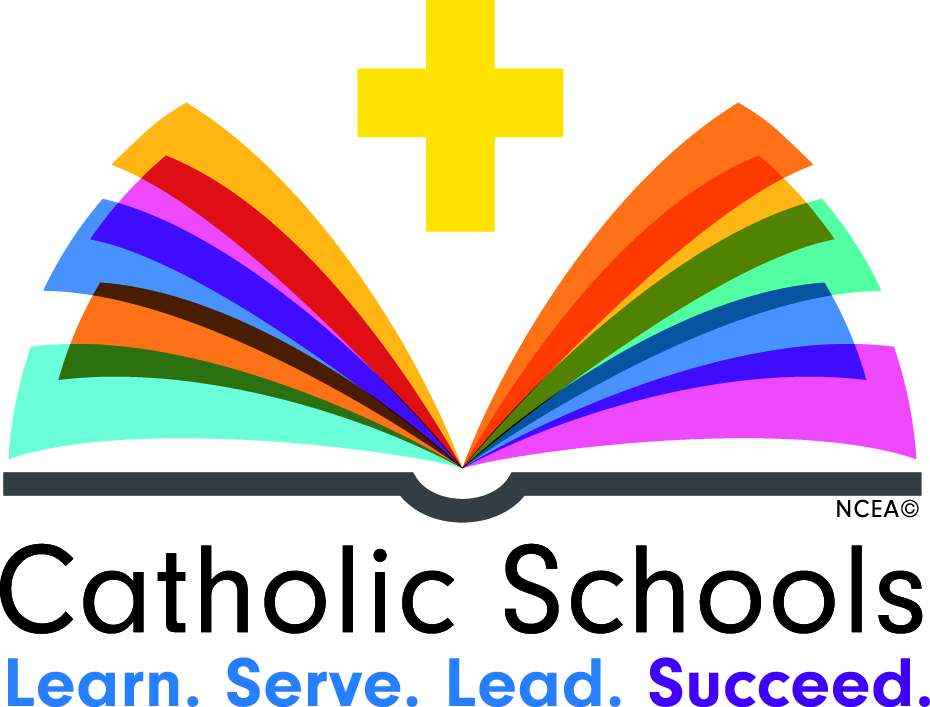
It was a near perfect attendance at the 2018 Mass and rally celebrating Catholic Schools Week in Arizona.
Some 6,429 elementary and high school campuses nationwide observed the annual celebration Jan. 28-Feb. 3. It pays homage to all who continue to keep the Catholic school system strong with special Masses, fun activities, tokens of gratitude, open houses, student showcases and acts of service.
Attending Mass, having the ability to pray openly and as a class are among the hallmarks of a Catholic education, Auxiliary Bishop Eduardo A. Nevares said during his homily at Ss. Simon and Jude Cathedral. Student and teacher representatives from almost every elementary and high school in the Diocese of Phoenix attended the all-school Mass, rally at the State Capitol or both Jan. 31. Several from the Dioceses of Tucson and Gallup joined them.
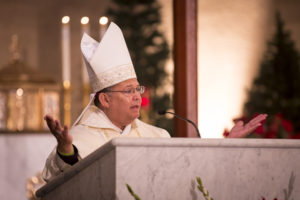
“[Catholic] Schools form students not only intellectually, but as the beautiful whole person God wants you to be spiritually, intellectually, morally and with a tender heart, with a caring heart for the least of our brothers and sisters,” Bishop Nevares said.
He pointed to the example of St. John Bosco whose feast day fell on the same day as the Mass. The founder of the Salesians longed to take care of needy children in a holistic way since he himself was a lad.
“They understood that they were to take care of the entire person — body and mind … and be truly alive in the gifts and the graces of the Holy Spirit,” the bishop said.
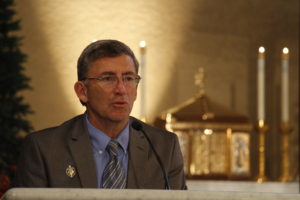
Several of those gifts of the Holy Spirit translated into the four prongs underscoring this year’s Catholic Schools Week theme which was “Catholic Schools: Learn. Serve. Lead. Succeed.” Harry Plummer, superintendent for the diocese, put it another way in closing remarks toward the end of the Mass: Catholic schools are places that instill “a faith that is firm, hope that is filled with joy and a charity that is active.”
Leading by example
All 29 preschool programs, 28 elementary schools and six high schools serving the Diocese of Phoenix consistently guide more than 15,000 students in that vision. Students rise to the occasion of meeting higher thresholds for achieving “A”s and “B”s and embrace healthy academic and athletic competition in the community.
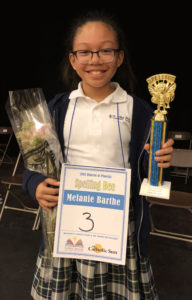
Two small examples include Melanie Barthe, a sixth-grader at St. John Bosco in Ahwatukee surviving 12 rounds to place first in the Diocesan Spelling Bee Jan. 30 and Ashley Menne who verbally committed to play golf at Arizona State University only months into her sophomore year at Xavier College Preparatory.
The Catholic school experience is far from being about developing themselves only. It’s about improving the lives of those within and far beyond campus walls too.
“I wouldn’t be who I am today if it wasn’t for the influence I had in the Catholic schools,” particularly regarding community service and giving back to others, explained Gracemarie Torzala, an alumna of St. Jerome. It took over a decade for a job that fit her skill set to open up at her alma mater. Meanwhile, she served at St. Francis Xavier and Most Holy Trinity.
Torzala has been campus minister at St. Jerome for 12 years. She was among four awardees recognized at Mass for significant years of service to the Diocese of Phoenix.
As for her longevity in the system: “I’ve always looked at it as a ministry, not a job. Since day one that’s always been my incentive. I’m giving back.
Serving others

St. Francis Xavier gave back during Catholic Schools Week via a corporal work of mercy per grade level. The effort aligned with a superhero uniform day and “committed to doing justice” theme to enhance the experience. Students at Sacred Heart in Prescott tackled hunger for the parish’s St. Vincent de Paul pantry with a “Souper” service effort that ended Feb. 2. Students placed donated canned goods and other non-perishables at makeshift end zones for whichever team they wanted to win the Super Bowl two days later.
A penny war at St. Matthew School was expected to raise some $550-$650 for the Sisters of Notre Dame de Namur’s Clean Water Project. Sisters serving the school and parish will send money to their counterparts in Kenya, the Democratic Republic of Congo and Nigeria to help quickly decontaminate water for local villages.
“More people die from contaminated drinking water than from AIDS, HIV and malaria combined,” explained Sr. BJ Letourneau, who saw the clean water fundraiser happen at an Ohio parish last summer. She demonstrated the process for St. Matthew parishioners and students during Catholic Schools Week. It only takes a dime and about 30 minutes to purify 2.5 gallons of water.
St. Peter Indian School in Bapchule was also expected to help via a “free” dress day.
Thanking, becoming leaders
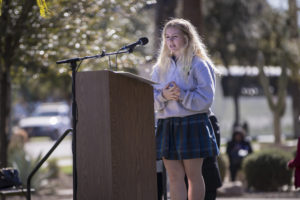
Immersion in and solidarity with people in another country were among the highlights of Molly Brown’s high school career at Xavier College Preparatory. She listed her mission project in Nicaragua, life skills from class and campus involvement and role with the pom team as formative experiences within a short speech at the annual legislative rally held during Catholic Schools Week.
Brown is keenly aware that such experiences were only possible for her and 40 percent of Xavier’s students through the tuition tax credit that comes to her in the form of need-based scholarships. Catholic Education Arizona awarded $16.7 million in scholarships in the Diocese of Phoenix last year, but the need was more than double that.
Still, students are grateful for the monies that do come through. Rally posters and cheers thanked Catholic Education Arizona and legislators for supporting school choice.
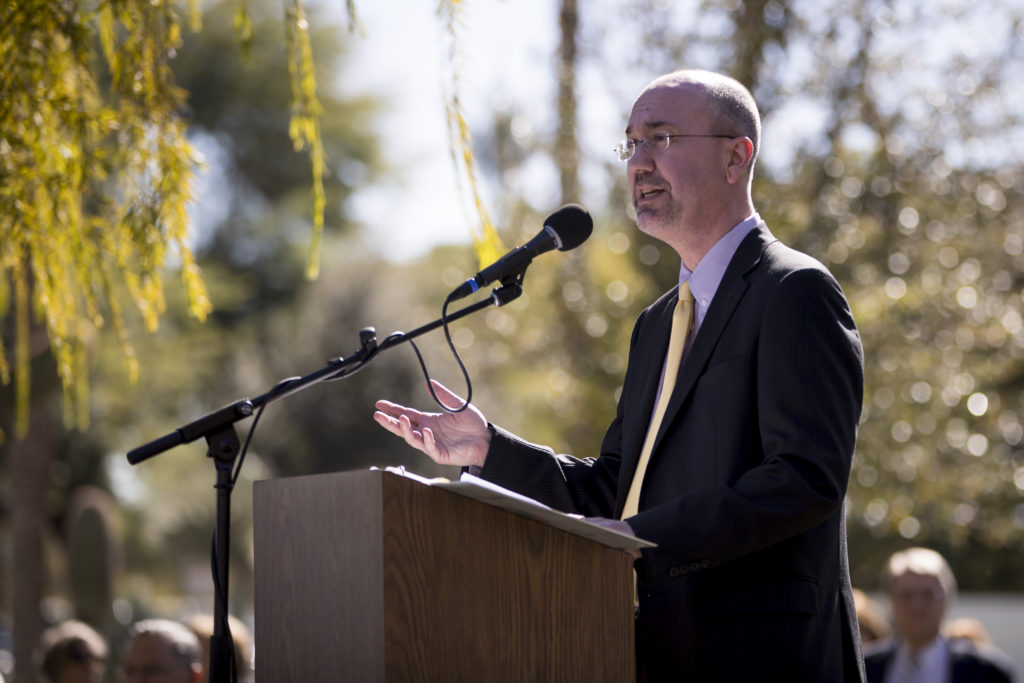
“School choice is important to our legislators. It’s important to reinforce that by bringing such a positive crowd to thank them and encourage them with their support of us,” Ron Johnson, executive director of the Arizona Catholic Conference, told The Catholic Sun. He described the enthusiasm as “contagious” and “impossible not to notice.”
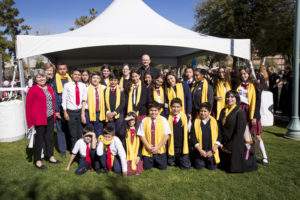
One thing students noticed this year was how little time some of Arizona’s bishops were Catholic school students themselves. Bishop Edward J. Weisenburger, the newly installed bishop of Tucson, always had a school as part of parishes he served as a priest in Oklahoma, but only spent second grade as a Catholic school student. Geography and conflict in Vietnam prevented further Catholic education for his family.
“I had a community around me that really loved me, maybe in the most stressful year of my life,” Bishop Weisenburger said.
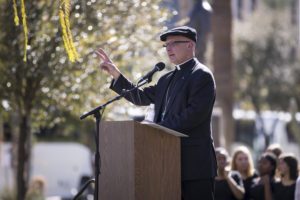 For Bishop James S. Wall of Gallup, it was kindergarten and sixth grade in as many East Valley schools. As a priest he served at St. Thomas the Apostle Parish and School before becoming a bishop. He called campuses “centers for prayer” and gently encouraged the crowd to pray for legislators, especially for their strength, wisdom and respect for human life.
For Bishop James S. Wall of Gallup, it was kindergarten and sixth grade in as many East Valley schools. As a priest he served at St. Thomas the Apostle Parish and School before becoming a bishop. He called campuses “centers for prayer” and gently encouraged the crowd to pray for legislators, especially for their strength, wisdom and respect for human life.
More from Bishop Wall
A number of legislators, including the Speaker of the House and President of the Senate, spent part of the lunch break at the rally with some offering brief remarks. Most of Arizona’s bishops conversed with dozens of legislators during regular visits in January.



